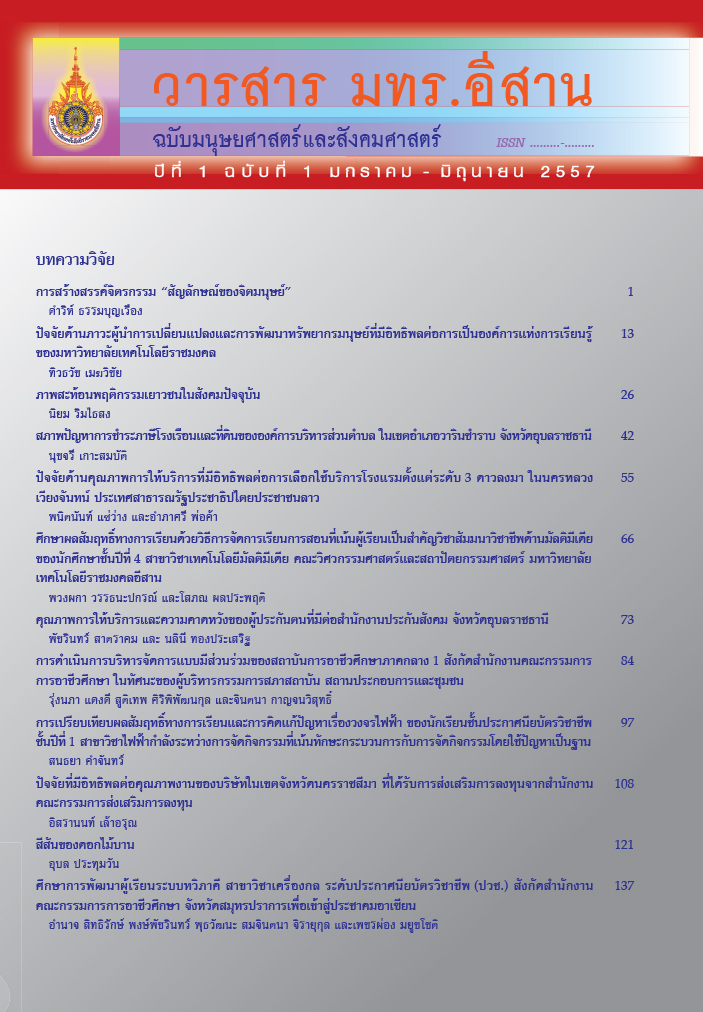Comparison of Academic Achievement and Problem solving the Electrical circuit of students in of First Year Vocational courses Electrical Power. Between the event focuses on Process Skills and Problem-Based Learning
Main Article Content
Abstract
The purposes of the study were to 1) Determine the efficiency of the Learning Activities that focused on process skills learning and problem-based learning on electrical circuits for first-year vocational certificate students that have proficiency standard at 80/80. 2) Determine the effectiveness index of the learning activity that focused on process skills learning and problem-based learning on electrical circuits for first-year vocational certificate students, and 3) Compare achievement and problem solving for first-year vocational certificate students between the learning activity that focused on process skills learning and problem-based learning on electrical circuits. The samples were 40 first-year vocational certificate students who majored in electrical power at Faculty of Industrial Technology Nakhon Phanom University. The samples studied in electrical and electronic components subject in semester 1, academic year 2013 They were divide in to 2 group, Which are Group 1 and Group 2. Each group consisted of 20 samples. The samples were obtained by purposive sampling. Instruments used in the study are three types of activities within a problem-based learning. (PBL) plan learning activities that emphasize process skills form the four plans include a 16 -hour test achievement types optional 5 options 40 items which had the difficulty (p) ranging from 0.62 to 0.75 in cost. discrimination (B) from 0.26 to 0.49, and the reliability of 0.92 and A multiple-choice test, a solution types optional 4 options 20 items which had the difficulty (p) ranging from 0.5 to 0.8 in cost. discrimination (r) from 0.2 to 0.75, and the reliability of 0.74. The statistics used in data analysis were percentage, mean, standard deviation. And hypothesis testing usingt-test (Independent Samples)
The results were as follows
1. The efficiency of learning activity that focused on process skills learning and problem-based learning on electrical circuit for first-year vocational certificate students was 88.75/86.62 and 83.54/80.37, respectively.
2. The effectiveness index of the learning activity that focused on process skills learning and problem-based learning on electrical circuits for first-year vocational certificate students was 0.7713 and 0.6616, It has been apparent that students have made progress in learning by 77.13 and 66.16 respectively.
3. The students that focused on process skills learning obtained more learning achievement and problem solving than students focused on problem-based learning. Therefore, there was a statistically significant at the 0.01 level.
Article Details
บทความที่ได้รับการตีพิมพ์เป็นลิขสิทธิ์ของมหาวิทยาลัยเทคโนโลยีราชมงคลอีสาน
ข้อความที่ปรากฏในบทความแต่ละเรื่องในวารสารวิชาการเล่มนี้เป็นความคิดเห็นส่วนตัวของผู้เขียนแต่ละท่านไม่เกี่ยวข้องกับมหาวิทยาลัยเทคโนโลยีราชมงคลอีสานและคณาจารย์ท่านอื่นๆในมหาวิทยาลัยฯ แต่อย่างใด ความรับผิดชอบองค์ประกอบทั้งหมดของบทความแต่ละเรื่องเป็นของผู้เขียนแต่ละท่าน หากมีความผิดพลาดใดๆ ผู้เขียนแต่ละท่านจะรับผิดชอบบทความของตนเองแต่ผู้เดียว
References
คจรศักดิ์ สิงหันต์. (2551). การเปรียบเทียบผลสัมฤทธิ์ทางการเรียน รายวิชาไฟฟ้าและอิเล็กทรอนิกส์เบื้องต้น ขั้นประกาศนียบัตรวิชาชีพขั้น ปีที่1. การศึกษาค้นคว้าอิสระ. วิทยาลัยเทคนิคนครพนม : มหาวิทยาลัยนครพนม
ชนะ ครีบกระโทก. (2550). การพัฒนาแผนการจัดกิจกรรมการเรียนรู้ที่เน้นทักษะกระบวนการกลุ่มสาระการเรียนรู้การงานอาชีพและเทคโนโลยี เรื่องการเพาะเห็ดนางฟ้า ชั้นประถมศึกษาปีที่ 6. การศึกษาค้นคว้าอิสระ. (หลักสูตรและการสอน). มหาสารคาม : มหาวิทยาลัยสารคาม
เบญจมาศ เทพบุตรดี. (2550). การเปรียบเทียบผลสัมฤทธิ์ทางการเรียน ความสามารถในการคิด วิเคราะห์ และความสามารถในการให้เหตุผลทางคณิตศาสตร์ ของนักเรียนชั้นประถมศึกษาปีที่ 6 ระหว่างการจัดกิจกรรมการเรียนรู้โดยใช้ปัญหาเป็นฐาน (PBL) และการจัดการเรียนรู้แบบปกติ เรื่อง การบวก ลบ คูณ หาร ทศนิยม. วิทยานิพนธ์การศึกษามหาบัณฑิต.
(หลักสูตรและการสอน) มหาสารคาม : มหาวิทยาลัยมหาสารคาม
บุญร่วม ตาลจินดา. (2551). การพัฒนาหลักสูตรท้องถิ่น เรื่อง การทำไม้กวาดดอกหญ้า กลุ่มสาระการเรียนรู้การงานอาชีพและเทคโนโลยี ชั้นประถมศึกษาปีที่ 5 ระหว่างการจัดกิจกรรมการเรียนรู้ โดยใช้ปัญหาเป็นฐานและการการจัดการเรียนรู้แบบปกติ. วิทยานิพนธ์การศึกษามหาบัณฑิต. (หลักสูตรและการสอน) มหาสารคาม : มหาวิทยาลัยมหาสารคาม
พิสุทธิ์ ชุมเดชะ. (2551). การเปรียบเทียบผลสัมฤทธิ์ ทางการเรียน ความสามารถการคิดวิเคราะห์ และเจตคติการเรียนวิชาเขียนแบบก่อสร้าง 1 เรื่องการใช้คอมพิวเตอร์ในการออกแบบระหว่างการจัดกิจกรรมการเรียนรู้แบบ CIPPA กับการเรียนรู้โดยใช้ปัญหาเป็นฐาน ชั้นประกาศนียบัตรวิชาชีพชั้นสูงปีที่ 1. วิทยานิพนธ์การศึกษามหาบัณฑิต. (หลักสูตรและการสอน). มหาสารคาม :มหาวิทยาลัยสารคาม
เพ็ญศรี พิลาสันต์. (2551). การเปรียบเทียบผลสัมฤทธิ์ทางการเรียนและแรงจูงใจใฝ่สัมฤทธิ์ทางการเรียนกลุ่มสาระการเรียนรู้คณิตศาสตร์ เรื่อง เศษส่วน ของนักเรียนชั้นประถมศึกษาปีที่ 5 ระหว่างการจัดกิจกรรมการเรียนรู้โดยใช้ปัญหาเป็นฐาน (PBL) กับการจัดกิจกรรมการเรียนรู้ตามวิธีปกติ. วิทยานิพนธ์การศึกษามหาบัณฑิต. (หลักสูตรและการสอน). มหาสารคาม :มหาวิทยาลัยมหาสารคาม
วิริยะสมร บัวทอง. (2554). ผลการจัดกิจกรรมการเรียนรู้ตามรูปแบบของเดวีส์และรูปแบบที่เน้นทักษะกระบวนการที่มีต่อผลสัมฤทธิ์ทางการเรียน เรื่อง การประดิษฐ์บายศรีความคิดสร้างสรรค์และเจตคติต่อการเรียนของนักเรียนขั้นมัธยมศึกษาปีที่ 1. วิทยานิพนธ์การศึกษามหาบัณฑิต. (หลักสูตรและการสอน). มหาสารคาม : มหาวิทยาลัยมหาสารคาม
ศิริกนก สุวรรณธาดา. (2550). ผลการจัดกิจกรรมการเรียนที่เน้นกระบวนการสาระเทคโนโลยีสารสนเทศเรื่องการใช้ซอฟต์แวร์ประมวลคำชั้นประถมศึกษาปีที่ 4. การศึกษาคันคว้าอิสระ. (หลักสูตรและการสอน). มหาสารคาม : มหาวิทยาลัยมหาสารคาม
สำนักงานคณะกรรมการการอาชีวศึกษา. (2545). หลักสูตรประกาศนียบัตรวิชาชีพ พุทธศักราช 2545 (ปรับปรุง พ.ศ. 2546). กรุงเทพฯ : สำนักงานคณะกรรมการการอาชีวศึกษา. กระทรวงศึกษาธิการ


